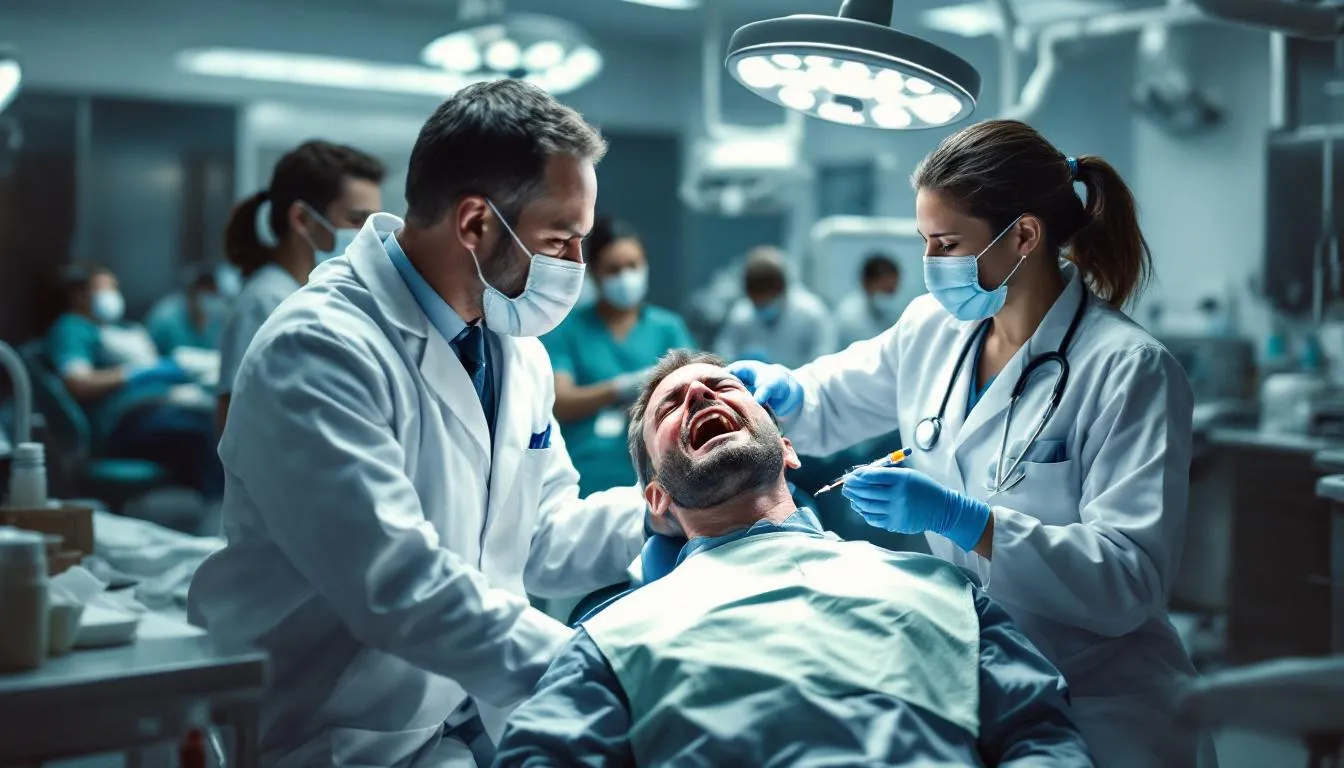Severe toothache? Broken tooth? You might be facing an emergency for dentist care. In this article, learn how to identify dental emergencies and what immediate steps you should take.
Key Takeaways
- Dental emergencies require immediate care to prevent permanent damage, including severe toothaches, broken or knocked-out teeth, and abscesses.
- Quick first aid steps, such as stopping bleeding and managing pain, are vital before reaching out to an emergency dentist for professional help.
- Affordable emergency dental services are available in Guelph, including community health centers and dental schools, to assist individuals without insurance.
Understanding Dental Emergencies
A dental emergency is defined as a dental issue that necessitates immediate treatment to prevent further complications. Ignoring a dental emergency can result in permanent damage or more serious issues, making swift action crucial. Common dental emergencies consist of:
- Severe toothaches
- Broken or chipped teeth
- Abscessed teeth
These urgent dental issues require prompt attention to avoid potentially severe consequences for your dental health and any dental problem.
Symptoms that might warrant emergency dental care include excessive bleeding, ongoing pain despite medication, or broken facial bones. Dental abscesses are particularly concerning, as they can lead to severe tooth pain, fevers, foul taste, and difficulty swallowing or opening the mouth.
Urgent dental issues that emergency dentists treat often include severe toothaches, broken teeth, and dental abscesses. Other common dental emergencies involve dental infections, lost fillings, dental trauma, significant bleeding, and injuries to the gums or jaw.
Recognizing common dental emergencies and their symptoms underscores the importance of seeking immediate dental care. This awareness helps in taking appropriate steps during a most common dental emergencies crisis.
Immediate Steps for Handling Dental Emergencies
In any dental emergency, acting quickly is vital to prevent complications like infection or tooth loss. Start by using gauze to stop bleeding, applying ice to reduce swelling, and taking over-the-counter pain medication. Avoid heat application to a toothache to prevent further tissue damage. Quick first aid can significantly reduce the risk of infection and additional damage.
Reach out to an emergency dentist promptly for professional guidance and treatment. If experiencing extreme pain, contact or visit the clinic immediately for an emergency dental appointment. Swift action alleviates pain and prevents complications that might require more extensive and costly treatment. If necessary, you may need to seek replacement treatment.
Prompt response to dental emergencies is crucial for maintaining oral health, and we accept dental emergency appointments in our emergency appointment book to prevent long-term damage.
Emergency Dental Services in Guelph
In Guelph, immediate dental care is readily available to address a variety of urgent dental issues, both during regular business hours and beyond. Emergency dental services are designed to save natural teeth and prevent infections from spreading, ensuring patients receive timely and effective care when they need it most. For those in need of reduced-cost options, certain dental clinics offer fees based on income to assist low-income patients. Additionally, dental schools in the area may provide emergency care at reduced costs as part of their training programs.
If you are experiencing a dental emergency, contact a dental clinic immediately for guidance. Many clinics, including Guelph Dentistry, provide emergency dental services and first aid advice over the phone, helping you manage the situation until you can receive professional care. Whether your emergency occurs during regular business hours or after, there are options available to ensure you do not have to wait for relief.
For urgent dental care in Guelph, Ontario, contact Dentistry on Guelph or visit their website for an online emergency dentist. Quick relief from dental discomfort enables patients to resume their routine pain-free and maintain their dental health without delay.
Common Dental Emergencies and Treatments

Dental emergencies can manifest in various dental emergencies, each requiring specific treatments to address the issue effectively. Common dental emergencies include:
- Severe toothaches
- Broken teeth
- Dental abscesses, which necessitate prompt treatment to avoid complications
- Lost or broken restorations such as fillings or crowns, which need immediate attention.
Emergency treatments for these issues can include:
- Tooth extractions
- Root canal therapy
- Temporary dental restorations
- Broken fillings
Soft tissue injury in the mouth, such as wounds, cuts, or lacerations, may require stitches depending on the severity. Knowing these common emergencies and their treatments prepares you for what to expect during emergency dental care.
Severe Toothache Relief
A severe toothache can be debilitating, often resulting from cavities, tooth infections, or dental abscesses. Over-the-counter pain relievers can help manage the pain until you can consult a dentist. Additionally, dental clinics often recommend a saltwater rinse to alleviate pain from abscess pain until professional treatment is available.
An emergency dentist:
- Provides pain relief
- May recommend treatments like a root canal procedure or emergency tooth extraction for an infected tooth
- Offers immediate care to prevent further complications and alleviate severe tooth pain, including emergency dental treatment.
Managing Knocked Out Teeth
This is a true dental emergency that requires swift action to save the tooth. If a tooth is knocked out, follow these steps:
- Reinsert it into the socket promptly if possible.
- If reinsertion is not possible, store the tooth in milk.
- Locate and preserve the tooth, keeping it moist.
- Contact an emergency dentist immediately.
For a knocked-out permanent tooth:
- Hold it by the crown and rinse it gently to preserve root tissues.
- Avoid washing the tooth to prevent removing essential root tissues.
- If you can’t place the tooth back in its socket, keep it securely in a cup of milk.
- Reach the dentist within 30 minutes to one hour to significantly increase the chances of successful reattachment.
Treating Chipped or Cracked Teeth
Chipped, cracked, or fractured teeth require immediate attention to prevent further damage, complications, and discomfort. Emergency treatments for these dental issues often depend on the severity of the damage and may involve procedures such as tooth filling, dental crowns, or dental caps to restore the tooth’s structure and function. In cases of a lost crown or broken dental restoration, applying temporary dental cement or sugarless gum can protect the exposed tooth until professional care is available, including cracked tooth treatment.
It is especially important to treat child dental emergencies promptly, as children’s teeth are more vulnerable to damage and complications. Pediatric patients may require specialized care to manage pain and ensure proper healing, sometimes involving sedation dentistry to manage anxiety and facilitate treatment.
Seeking professional dental care immediately after experiencing a chipped or cracked tooth helps address any underlying issues and preserves the tooth’s integrity. Swift action can prevent the need for more extensive treatments later, reduce further pain, and protect surrounding teeth from damage. Whether dealing with adult or child dental emergencies, timely intervention is key to maintaining good dental health and avoiding long-term complications.
Affordable Emergency Dental Care Options
Although dental emergencies can be financially challenging, affordable emergency care treatments options exist. Community health centers often offer low-cost emergency services for uninsured individuals. Emergency dental care programs may also include payment plans for those struggling to afford treatment.
In Guelph, individuals needing urgent dental care without dental insurance should look into local dental clinics or community health centers that offer affordable urgent dental services for emergency patients. Making contact with dental offices and describing your situation can also lead to payment schedules or reduced-cost urgent care to accommodate emergency patients.
The Role of an Emergency Dentist
An emergency dentist is crucial for providing immediate care during unexpected dental crises. Their primary responsibility is to offer immediate care for urgent needs, alleviating pain and preventing further oral health complications. Emergency dentists are available outside of regular hours, ensuring that patients receive prompt treatment when needed most.
Preparing for a Dental Emergency

Preparation is key to how to handle dental emergencies effectively. A dental emergency kit should include basic hygiene tools like a toothbrush and dental floss to help clean affected areas safely. Including a dental mirror in your emergency kit allows for a better examination of hard-to-see areas in the mouth.
Being prepared can make a significant difference in how quickly and effectively you can respond to a dental emergency.
When to Visit an Emergency Dental Clinic
Recognizing when to visit an dental emergency clinic is crucial for timely care. Immediate treatment is necessary for issues like uncontrolled bleeding, severe pain, or saving a tooth. Seek emergency care for severe tooth pain, knocked-out teeth, or dental trauma.
Symptoms like uncontrolled bleeding from the mouth, severe pain, or loose teeth indicate the need for dental care. The sooner you see an emergency dentist for issues like a knocked-out tooth, the better the chances of saving it and preventing unexpected tooth loss.
Summary
Dental emergencies can be sudden and alarming, but knowing how to respond quickly can make all the difference. Immediate steps such as using gauze to stop bleeding, applying ice to injuries, and taking pain medication can help manage the situation until professional care is available. Emergency services in Guelph, including those offered by Dentistry on Guelph, provide quick relief from dental discomfort, allowing patients to resume their routine pain-free.
Affordable care options, such as community health centers and payment plans, ensure that financial constraints do not prevent you from receiving the necessary treatment. Preparing for dental emergencies with a well-stocked kit and knowing when to visit an emergency dental clinic empowers you to handle any dental crisis with confidence.
Frequently Asked Questions
What constitutes a dental emergency?
A dental emergency requires immediate treatment to avoid complications, including severe toothaches, broken teeth, or dental abscesses. Addressing these issues promptly is crucial for your oral health.
What should I do if I have a knocked-out tooth?
If you have this problem, reinsert it into the socket as soon as possible or place it in milk if you can’t, and seek emergency dental care immediately. Time is critical for the best outcome.
Are there affordable emergency dental care options available in Guelph?
Yes, Guelph has community health centers and dental clinics that provide affordable emergency dental care, often with flexible payment options for those in financial need.
How can I prepare for a dental emergency?
To effectively prepare for a dental emergency, maintain a dental emergency kit that includes basic hygiene tools, a dental mirror, dental wax, and your dentist’s contact information, along with details for local emergency dental clinics. This readiness can make a significant difference in how you manage an urgent dental situation.
When should I visit an emergency dental clinic?
You should visit an emergency dental clinic for uncontrolled bleeding, severe pain, knocked-out teeth, or significant dental trauma. Prompt attention is crucial in these situations to prevent further complications.




